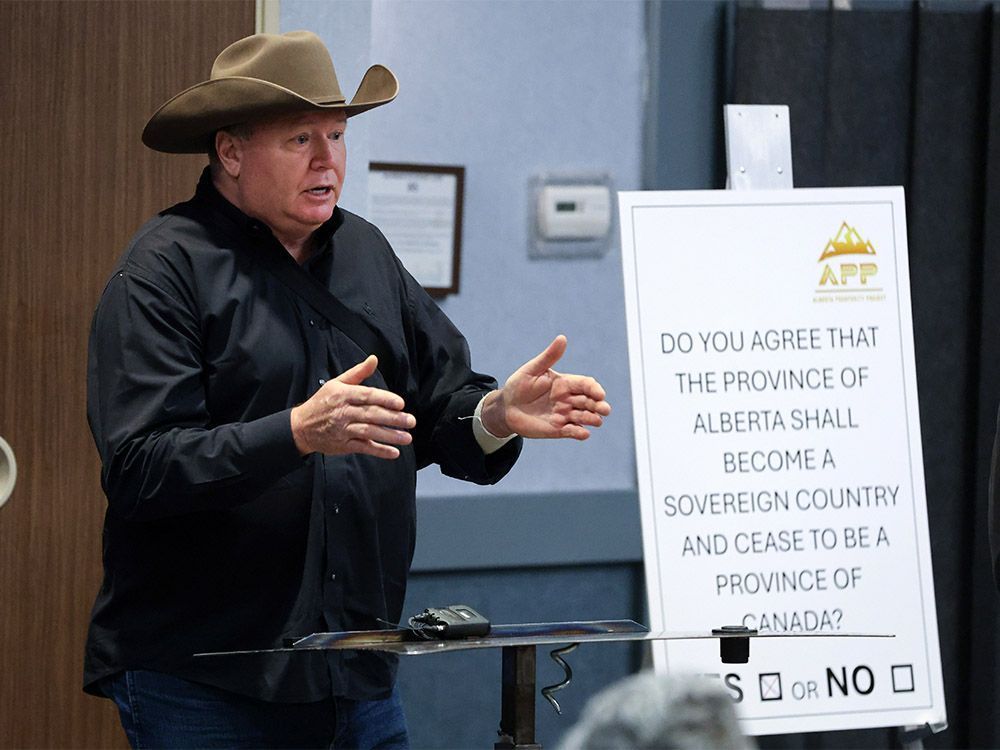
A leader of the Alberta separatist movement has been reprimanded by the Law Society of Alberta for a second time in four months, after he admitted to twice breaching professional standards.
Foothills-based lawyer Jeffrey Rath was issued the reprimand during a virtual hearing Friday morning along with an order to pay $800 in costs within 30 days.
Those actions were related to a pair of stay applications filed by Rath along with another lawyer, Mark Freeman, in 2016 and 2017 as part of a legal action filed by their then-client the Sturgeon Lake Cree Nation against the federal and provincial governments.
In a 2022 ruling, Alberta Court of King’s Bench Justice Doreen Sulyma awarded approximately $235,000 in costs against Rath and Freeman, noting they had missed deadlines for affidavits, made redundant arguments on issues that had already been ruled on, and filed frivolous applications.
“I conclude that much of the conduct discussed above was more than zealous representation and was not at the clients’ instructions, nor in the clients’ best interests,” Sulyma wrote, characterizing the lawyers’ conduct as “unreasonable, persistent, and disruptive.”
This year, Rath admitted to law society allegations from those actions that he “took steps in the representation of a client that were clearly without merit” and also “unreasonably delayed the process of a tribunal.”
At Friday’s hearing, Rath’s lawyer, Ed Halt, described Rath’s role in the case as one of “limited supervision.”
“While he played a role in respect of the action, he was not the lawyer who had boots on the ground with respect to all aspects.”
The reprimand and fine were the product of a joint submission between Halt and the law society, with tribunal chair Jim Lutz also noting the “substantial” fine already imposed by the court.
“I appreciate that we have a role, sometimes thankless, in the job of the courts. We take unpopular positions, but we should never, ever lose sight of the fact that we have to do it within the context of the rules of the Law Society of Alberta, code of conduct, and, of course, Legal Professions Act,” Lutz said.
“I’m quite confident that you’ll continue to advocate fiercely for your client, but this will be a reminder that there is a line that we have to remember.”
Rath’s office replied to a message from Postmedia but has yet to offer comment on Friday’s ruling.
Separatist lawyer
Rath is one of the lawyers for the Alberta Prosperity Project which purports the potential benefits of the province seceding from the rest of Canada.
The group is seeking to use citizen initiative rules to put a referendum question to Albertans that asks, “Do you agree that the province of Alberta shall become a sovereign country and cease to be a province in Canada?”
Whether that can be put the public is the subject of ongoing litigation after Alberta’s chief electoral officer Gordon McClure referred that proposed question’s validity to the courts, questioning if it broke provincial law by proposing action that would be unconstitutional.
Rath has also claimed he and Alberta Prosperity Project members have met with U.S. government officials in Washington on several occasions , including as recently as last month, where he said the group met with unspecified cabinet-level officials, saying “we’re literally one degree of separation from the Oval Office.”
The U.S. State Department has not responded to requests from Postmedia seeking to confirm those details.
The Alberta Prosperity Project’s petition was beaten to the punch by a rival group dubbed “Alberta Forever Canada” and led by former deputy premier Thomas Lukaszuk.
It is asking Albertans, “Do you agree that Alberta should remain in Canada?”
Provincial legislation bars any potential referendum questions on the same subject.
Lukaszuk’s petition was presented June 30 and approved a month later, albeit under prior rules that require just under 294,000 signatures in support within 90 days.
The separatist question was presented several days after Lukaszuk’s and via legislation that came into effect over the summer that reduced the number of signatures to 177,000 and increased the time frame to gather them up to 120 days. The group cannot yet begin pursuing those signatures until the legality of their proposed question is settled.
Prior discipline
Rath also faced discipline from a law society tribunal earlier this year.
In July , he was reprimanded and ordered to pay $10,000 in costs over a separate set of allegations.
Then, Rath admitted he failed to co-operate with Thunderchild First Nation after it fired him and he took six months to transfer legal records to the nation’s new lawyer.
He also admitted to misrepresenting to the court that he was Thunderchild’s lawyer when in fact he had been fired two months earlier.